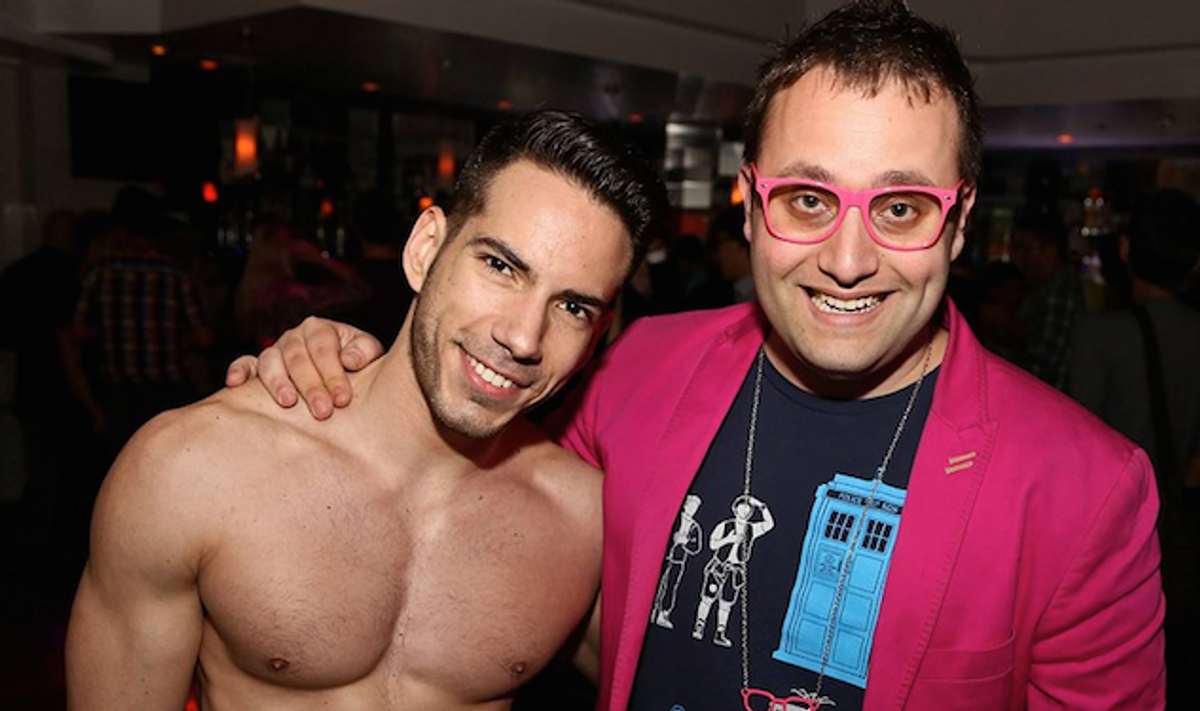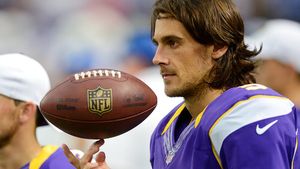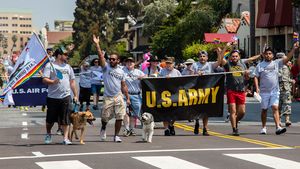Justin Luke (right) at Penthaus Thursdays | Photo by JJ Mack Photography
Young gays are in a vulnerable state, but they're also full of wonder and excitement, emerging into their sexuality with more rights and opportunities than gays of yore. In comes Justin Luke, one of NYC's most popular party promoters, and co-owner (with Alan Picus) of BoiParty.com, which throws regular young-gay-oriented events at clubs like Copacabana and Up & Down. Based on his experience with this demographic, the Long Island-born Renaissance man has written The Gay Gospel, a self-help guide for gay twentysomethings, which will come out on November 18 (though the e-book is orderable now here). Having contributed the foreword for the book (Yes, I was in my twenties once and even remember it), I cornered Justin, who's 32, for a chat about his attempt to enrich the lives of those who are younger and more impressionable.
Musto: Hi, Justin. Why did you want to do a book giving advice to young gays?
Justin Luke: I just celebrated my five-year anniversary with BoiParty. Over the past five years, I've found myself in situations dishing out advice to my guests. They always come to me. They're dealing with an ex or they like this guy or should they do this together or how do they break up? I thought, "Rather than give advice and have it disappear into nothingness, why not put it all into a book?"
OK, but what's so fascinating about twentysomething gays as a target audience?
They're experiencing things for the first time. And this generation is comfortable to be out and gay. They're just dealing with life problems. In the afterword to the book, Billy Porter [Tony winner for Kinky Boots] talks about growing up during the AIDS crisis. We were so busy going through battle lines that we didn't have time to ask questions like, "How do I dump this guy?" But now these questions can be asked. A whole generation was lost to AIDS--forefathers who could give their knowledge of how to live their lives. It's a new situation where gays are coming out in droves, comfortable with being who they are. That's what the book is. It's not, "How do I cope with being gay?" and so on. It takes for granted that you've figured that out or will be able to.
So you amply cover romance in the book?
Yes. I have subdivisions like the Book of Living, the Book of Dating, the Book of Fucking, the Book of Breaking Up, and so on.
And your primary advice is...?
You don't need a boyfriend. If you are saying that you need a boyfriend, the last thing you actually need is a boyfriend. A boyfriend is not going to fix all your problems. Fix yourself and work on you to the point where a boyfriend would be a nice addition.
OK, but let's say you've got one anyway, and you don't want him anymore. What's your sage advice about ending it?
I give a couple of different options. First of all, if you're breaking up with someone, then please realize that you're the asshole. Don't try to come out looking clean.
But what if the boyfriend was the asshole and that's why you want to break up with them?
That might be the case, but you're the one breaking up. Anyway, don't do it with any texts, emails, or phone calls. Go straight in person and talk it out. If you want to, give a reason, but it doesn't really matter because it won't be accepted.
How do you feel about young gays having open relationships? Does that help avert breakups?
I have a large chapter on that. I know lots of very happy open relationships and lots of very happy not open relationships. I also know miserable ones of both types. I say there's one kind of monogamous relationship and unlimited kinds of open ones. I know a couple who are completely monogamous, but they go on vacation one week a year to Mykonos or wherever, and while they're on vacation, they can fuck whoever they want or have threeways. That's their open relationship. I know a couple who are 100% monogamous, but they're allowed to make out with other people when they go out at night. That's it. And that's their open relationship. It's a case-by-case basis. To have an open relationship that works, you have to figure out your specific body of rules and understandings. It's not guaranteed happiness. Don't expect that your relationship becomes perfection the second you open it. There are still arguments. But sexual monogamy is not the reason to end a perfectly great relationship. An open relationship is very much an option for everyone to consider.
How about dating via all those apps and sites, which seems the way to go these days?
I don't talk that much about it in the book. I talk about dealing with a fake profile. But I don't think it needs much explaining. Most people tend to know how to work it. If you can order a cleaning person online, why not a date? When I was in my twenties, it was very taboo to admit you met someone online. Now it's OK. That's how the word is turning.
Is it OK for a young gay to say, "I want to live a relatively quiet, anonymous life. I don't even want to go to nightclubs"?
Sure: From 21 to 25, I didn't even drink or go to clubs.
Did you make up for lost time?
I pretty much did. But nightlife is not a mandatory thing. We should stop judging each other. Either you go out and party or you don't. No one has the right to stand on a pedestal and judge. We all need to stop judging each other because there's plenty of judgment against us already.
Are most of the gay twentysomethings you deal with twinks?
They come in all types. There's a lot of muscle going on these days, with their protein shakes and going to gym. Muscle is in vogue right now--and facial hair. When I was a kid, everyone was skinny. It was all about that heroin chic look. But now they're very upset about how skinny they are. They're trying to muscle out. Maybe they're rebelling in the opposite direction.
Whether they're muscley or skinny, committed or open, do you feel that gay twentysomethings are extra sensitive because things are new to them? Aren't they sometimes like walking raw nerves?
They're very extra sensitive, very vulnerable. There's a propensity for judgment. I started a Facebook group called GG 20 (Gorgeous, Gay and twentysomething). It lets me watch how they interact. Older people get the struggle, how the world turns, and they are a little more willing. But a lot of twentysomethings are quick to judge. I'm trying to get them to calm down, take a breath, and not take everything so seriously. No one expects you to have your shit together. And if a relationship ends, it doesn't mean you're broken!
That's good news for those who are trying to start one. Thanks, Justin. Good luck with the book.
>>>CLICK FOR BILLY PORTER'S NEW PLAY & MORE THEATER NEWS

Micah Stock, Megan Mullally, Rupert Grint & Nathan Lane in 'It's Only a Play' | Photo by Joan Marcus
IT'S ONLY A GAY
Gays of all ages will note that this is a big season for the theater making fun of itself. In Donald Margulies' The Country House, a bunch of theatrical sellouts, has-beens, and aspirants are gently roasted like chestnuts. And now, Terrence McNally's It's Only a Play--updated from an old work of his--goes to town on the egos of Broadway types, only to bathe their delusions in a sort of affectionate glow that makes you like them despite it all. [Warning: A few gentle spoilers lay ahead.] The campy comedy is set at the opening night party for a play by the exceedingly nervous Peter Austin (Matthew Broderick) called The Golden Egg, at the townhouse of the ditzy producer played by Megan Mullally. Master funnyman Nathan Lane is utterly hilarious as Broderick's supposed best friend James Wicker, an actor who's sold out to TV and is glad he did; asked what he thought of The Golden Egg, he runs around opening night impersonating a giant turkey.
Lane is priceless bantering with a clueless, deadpan coat check boy (a very good Micah Stock, who could easily become the next Jim Parsons) and cracking that he and Ryan Seacrest are good friends; "We both dated Ellen DeGeneres." Lane is even better on the phone with a cohort, ragging on everyone in town, whether fictional or real, while unleashing a torrent of wisecracks. (He recounts how Katie Couric mistakenly introduced Rita Moreno as Chita Rivera, for one thing. Ay, dios mio.) In comes The Golden Egg's leading lady, a drug-addled, homophobic actress with a parole officer and an Oscar for playing a character one critic assumed was autistic, though she actually wasn't. Stockard Channing is divinely funny in the part, wringing wry laughs from every neurosis and ankle bracelet buzz. It's all very light and bitchy--"Liza Minnelli is a cunt..."--but after a while, the name dropping becomes a bit hollow and by the time Broderick arrives, spouting weird monologues about the importance of original theater, one wonders why any of these people would waste two seconds with each other.
Fortunately, Act Two restores the mirth, once Ben Brantley's New York Times review of The Golden Egg comes in and goes after James Wicker--you know, Nathan Lane--who isn't even in the play! (The review states that Wicker's replacement in a previous work, Harvey Fierstein, "brought more masculine menace to the role" than he did. Lane has fun with this painful bit of criticism.) Things are zippy again, but the last 20 minutes or so bog down in unrealistic twists that have the whole crew (including F. Murray Abraham as a vicious critic and Rupert Grint as an enfant terrible director who's all posturing) angling to carry on together. So it's an up-and-down evening with impeccable, gut-busting cleverness interspersed with a few labored moments. (Nathan is not only assigned a wink-wink Addams Family joke, but a line about Nathan Lane.) By the way, Broderick got the last bow the night I saw it, which is either McNally's nod to the importance of the playwright or the ultimate act of largesse from Nathan Lane.
You keep saying "It's only a play" during the Off-Broadway revival of Frank Marcus's The Killing of Sister George, a legendary step backwards for queer visibility. The black comedy/melodrama hit Broadway in 1966, when anything even remotely gay positive would have been greeted like a bucket of water in the Sahara. Instead, it presented the tale of truly twisted lesbians--a grown woman who dresses like a child and plays with dolls, and her lover, an older actress who, when she's upset, puts Childie in a chokehold or makes her eat cigar butts. Somehow the play never won a GLAAD award, LOL, especially since a lady producer from the BBC comes over, not only to fire the actress from the serial she's appeared on for years, but to try to sweep Childie away into her own predatory clutches.
The 1968 movie version was smart to play this all to the hilt, with original star Beryl Reid entertainingly chewing the scenery as "Sister George" and Coral Browne sardonically strong as the producer. (Plus a kinky love scene with her and Childie was added, to make things even more luridly sensational). But the valiant new production by TACT, at the Beckett Theatre, isn't nearly revelatory enough to make Sister George seem worthwhile. Given a milder, perhaps more humanizing approach, these psychos come off not only as a blot on our history, but an impingement on our time.

S. Epatha Merkerson (left) and Sharon Washington in "While I Yet Live' | Photo by James Leynse
Way more pride is infused in While I Yet Live a new play by Billy Porter, who thankfully wasn't too busy writing afterwords for books aimed at gay twentysomethings. His debut play is a hodgepodge of revelations and confrontations based on his own experiences as a gay youth in a Pentecostal family in Pittsburgh. The righteous homophobia is just one of the threads he's addressing here. In Act One alone, Porter also touches on cancer, pedophilia, a sexual revelation, threats of violence, dementia, diabetes, dyslexia, palsy, abandonment issues, war trauma, hallucinations, and ghosts of departed loved ones! Even if it's all true--including the ghosts--it's a little too much for the constructs of an ordered stage play. Making the melodramatic stew go down easier is writing with a lot of passion and acting with heart (led by the wonderful S. Epatha Merkerson as mama Maxine), plus a healthy distrust of the Bible, especially when it comes to LGBT issues. And the play eventually brings reconciliation and forgiveness--something I'd already learned when Cyndi Lauper held up the drink line in the theater with a lot of questions, LOL.
Broadway types are just too hilarious, and now, it seems, some movies are angling to gently roast them, too. Seen at the New York Film Festival this weekend, Alejandro G. Inarritu's Birdman is a rich, layered, and deeply original look at a former action star (Michael Keaton) who's turned to Broadway melodrama as he juggles insecurity, an obnoxious costar, and bouts of magical realism. (He doesn't only see ghosts, he can make them.) And there's an LGBT moment. Keaton's beleaguered actress girlfriend (Andrea Riseborough) and another actress (Naomi Watts) start appreciating each other in the dressing room, prompting Riseborough to plant a passionate kiss on Naomi's lips. "What are you doing?" squawks Naomi, who two seconds later, adds: "Do it again!"
But it's theater-viewing that I'll be clearly doing with repetition. In fact, I already have something set for 2015! The two-part Royal Shakespeare Company production of the historical drama Wolf Hall isn't opening on Broadway until April, but they sent out the press invites last week, claiming everyone's so busy that time of the year that they'd love us to book it now! A slave to opportunity--and a prime candidate for OCD--I immediately RSVPd. So, six months in advance, I have free theater tickets lined up, and as a result, I'm suddenly almost looking forward to turning older.



























































































Did 'The White Lotus' waste Lisa's acting debut?